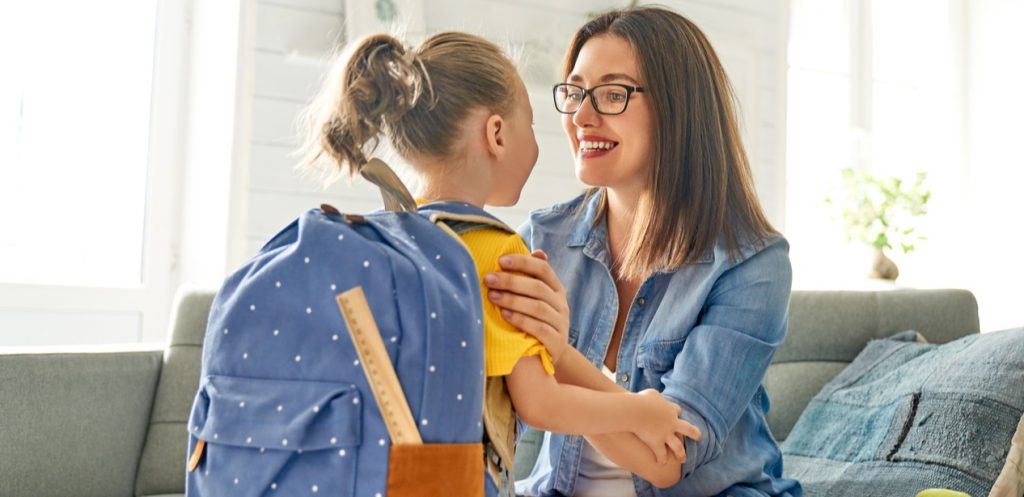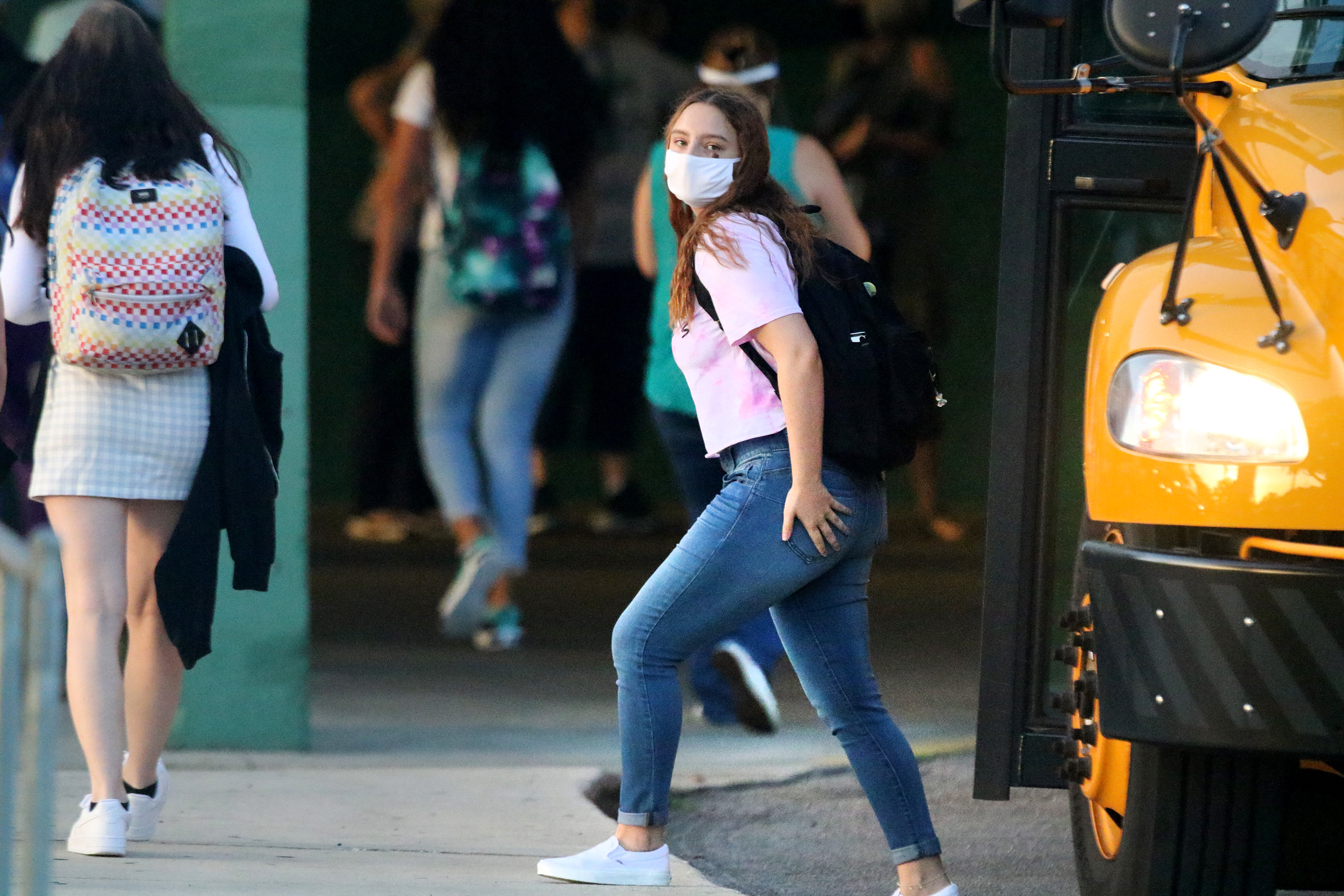
Helping Kids Back Into the School Routine
Lianna Wilson, MA, and Sarah Straus, MS
As the summer comes to a close and school is getting back into session, here are a couple quick reminders to help make the transition from the beach to the classroom easier for you and your child.
Validation: Let your child know that his nervous or apprehensive feelings about the start of school are normal. All kids (and adults!) have a hard time getting back into the routine of the school year. The knowledge that he is not alone in this experience will help your child feel he’s being heard and understood.

Homework: Another transition that can be rough after a summer break is homework completion. Like the morning routine, providing your child with a structured schedule can help him stay focused and motivated. Completing homework as soon as school is over and with continuous parental support will take advantage of the daylight hours and provide encouragement, motivation, and assistance when needed. Snacks are a great way to keep your child’s energy up while he works through those tough math problems. Of course, some children have active schedules, with team sports, music classes, or afterschool clubs, which can make engaging in homework more difficult. Letting your child know that you understand the hard work he is putting in and being ready with frequent positive feedback for his effort can help motivate him to get homework done.
Morning Routines: A common change that occurs as we begin the school year is a new morning routine. To help your child be successful, discuss what her morning routine will look like during the school year. This way, your child knows what will be happening and has clear expectations that are valuable to her under the time pressure of getting ready for school. Provide your child with simple, well-defined, and easy steps for her routine so that she has a clear idea of what you expect and so that it’s easy to follow along with you! Having an easy-to-reference schedule, maybe with pictures, can engage your child and provide a wonderful visual guide for what she needs to do next. Giving specific praise when she completes each lets her know that you love what you’re seeing. This will increase your child’s chances of success in the future, and helps build her self-esteem.

Bedtime: Bedtime is one of the hardest transitions. Children may be accustomed to going to sleep later and/or waking up later during the summer, so the new school schedule can be difficult to get acclimated to. As with the morning routine, having a nighttime schedule can assist in creating a structure for your child. Set your child up for success with clear expectations, simple step-by-step instructions, and praise at the completion of each step. Additionally, visual reminders can help your child have something to refer to as she goes about her routine. Most kids want more time watching their favorite TV show or finishing that last level of a videogame, and setting time limits can be a great way to put a boundary around the winding down time that they need each evening.
Back-to-School Resources for Families and Educators
This list was compiled by Child Mind Institute, and contains practical tools and expert advice to help you make the best of going back to school during the coronavirus crisis. Continue reading to find resources for parents and caregivers, young adults, and educators!

Going back to school during COVID:
Back-to-School Anxiety During COVID
Helping kids manage fears and gain independence.
Modifying an IEP or 504 for Distance or Hybrid Learning
How to help kids get essential school supports.
How to Set Priorities This School Year
What to do when you can’t do it all.
Preparing for Back-to-School Success
Setting kids up to thrive, despite the uncertainties.
Questions That Parents of English Language Learners Should Ask Schools This Fall
How to make sure your child gets what they need.
Managing Your Own Anxiety During School Reopening
Strategies to help you stay calm.
Tips for Partnering With Teachers in the New School Year
How to set up effective lines of communication.
Supporting Students’ Mental Health During COVID
Strategies for teachers during remote or hybrid learning.
Managing Students’ Behavior During Remote or Hybrid Learning
Tips for teachers in an uncertain time.
5 Reasons Students Aren’t Engaging in Distance Learning
How teachers can support students from afar.
How to Begin Positive Relationships With Families
Eight tips for educators to try.
Building Positive Relationships With Students: What Brain Science Says
Strategies for fostering strong teacher-student bonds.
For parents:
Strategies for Supporting Learning at Home
Guidelines and strategies from our experts to help families support children of any age with remote learning.
Back-to-School Tips for Kids Who Are Struggling
How resetting expectations and planning ahead can help children with learning challenges.
How to Help Kids Who Are Too Hard on Themselves
Bolstering self-critical children who tend to talk themselves down.
Anxious Stomach Aches and Headaches
Physical symptoms are often the way children experience anxiety.
Helping Kids Get a Good Start in College
Now is no time to give up meds and “go it alone.”
How to Help Kids Talk About Learning Disabilities
Sometimes opening up about learning differently is hard, but with practice, the rewards can be huge.
How to Help Kids With Math Anxiety
Give children the tools to face math with confidence.
School Success Kit for Kids With Sensory Processing Issues
Tools and strategies to help kids stay comfortable and focused.
School Success Kit for Kids With ADHD
Helping kids manage time, stay focused and handle homework.
How to Help Kids With Working Memory Issues
Supportive strategies for student success.
Learning Disability Diagnosis and English Language Learners
How parents can help kids get the right support.
Helping Kids Who Struggle With Executive Functions
Advice from learning specialists on how to build organizational skills.
For young adults:
Tips for Getting a Good Start in High School
Strong study habits make all the difference.
How to Help Yourself Get Organized
Realistic tips for young people, from someone who’s been there.
For educators:
Tips for Recognizing Learning Disorders in the Classroom
Characteristics of learning disabilities that can hide in plain sight.
How Trauma Affects Kids in School
Signs of trauma, and tips for helping kids who’ve been traumatized.
Anxiety in the Classroom
What it looks like, and why it’s often mistaken for something else.
What Does OCD Look Like in the Classroom
How to recognize the signs that a child is struggling.
What’s ADHD (and What’s Not) in the Classroom
Signs that a child might have ADHD, and other problems that may be confused with it.


